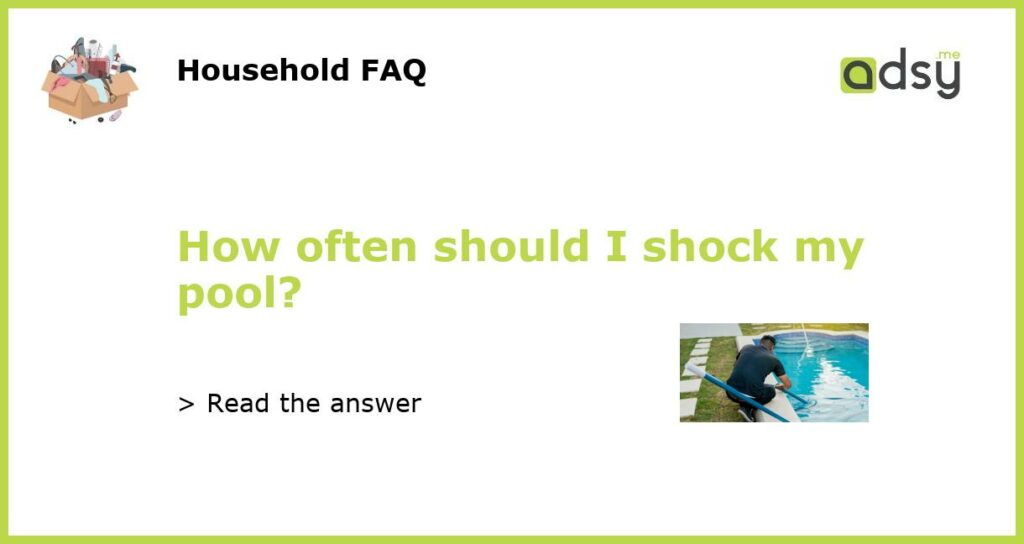How Often Should I Shock My Pool?
Shocking your pool is an essential part of pool maintenance. It helps to sanitize the water and keep it clear and safe for swimming. But how often should you shock your pool? The frequency of pool shocking depends on several factors, including the size of your pool, the weather conditions, and how frequently it is used.
Understanding Pool Shocking
Before we dive into the frequency of pool shocking, let’s understand what it means to shock a pool. Pool shock is a process where you add a high dose of chlorine or another oxidizer to the water. This superchlorination breaks down organic matter, such as sweat, urine, bacteria, and algae, that may have accumulated in the water. It helps to kill bacteria and other harmful contaminants, resulting in cleaner and safer water for swimming.
Factors to Consider
When determining how often to shock your pool, you should consider the following factors:
- Pool Usage: The more frequently your pool is used, the more contaminants it will accumulate. If you have a high bather load or frequently host pool parties, you will need to shock your pool more often. Heavy usage can introduce sweat, oils, and other organic material into the water, making it more prone to bacterial growth.
- Weather Conditions: The weather plays a significant role in pool maintenance. Hot and sunny weather can increase the rate of bacteria growth and chlorine consumption. If you live in an area with high temperatures and intense sunlight, you may need to shock your pool more often. Additionally, heavy rain or storms can dilute the pool water and affect its chemistry, requiring extra shock treatments.
- Pool Size: The size of your pool is also an important consideration. Smaller pools tend to accumulate contaminants more quickly and may require more frequent shocking. Larger pools, on the other hand, may have a larger volume of water to dilute contaminants, resulting in less frequent shocking. Consider the size of your pool when determining the shock treatment frequency.
- Chemical Levels: Regularly test your pool water to monitor its chemical levels. If you notice that the chlorine level is consistently low, it may be a sign that your pool requires shock treatment. Maintaining proper chemical levels in your pool will help to prevent bacteria growth and keep the water clear and safe. Follow the guidelines provided by your pool manufacturer or consult a professional for appropriate chemical levels.
- Algae Growth: Algae can quickly take hold in a pool if conditions are favorable, such as warm water and improper chemical balance. If you notice the presence of algae in your pool, it is a sign that it needs to be shocked. Shock treatments will kill and prevent the growth of algae, helping to keep your pool clean and clear.
Recommended Shocking Schedule
Based on the factors mentioned above, here is a general guideline for how often you should shock your pool:
- Weekly: It is recommended to shock your pool on a weekly basis, especially during the peak swimming season or if the pool has heavy usage or high bather load. This weekly shock treatment will help to maintain adequate sanitation and prevent the buildup of contaminants.
- During Heatwaves: If you experience a heatwave or unusually hot weather, consider shocking your pool more frequently. Hot weather can accelerate bacteria growth and chlorine consumption, necessitating extra shock treatments.
- After Heavy Rainfall: Following heavy rain or storms, it is advisable to shock your pool. This will help to restore the chemical balance of the water, which may have been affected by dilution or contamination from rainwater.
- When Chemical Levels are Low: If your regular pool water testing reveals consistently low chlorine levels or improper chemical balance, it is time to shock your pool. This will help to restore the appropriate chemical levels and prevent bacteria growth.
- Algae Infection: If you notice the presence of algae in your pool, it is crucial to shock it immediately. Algae growth can quickly get out of control and make the pool water unsafe for swimming. Shock treatments will kill the algae and prevent further growth.
The Bottom Line
Regularly shocking your pool is essential for maintaining clean and safe swimming water. The frequency of pool shocking depends on factors such as pool usage, weather conditions, pool size, chemical levels, and the presence of algae. Based on these factors, it is generally recommended to shock your pool on a weekly basis, with additional treatments during heatwaves, after heavy rainfall, when chemical levels are low, or in the presence of algae. Consult the guidelines provided by your pool manufacturer or seek advice from a pool professional to determine the best shock treatment schedule for your specific pool.

